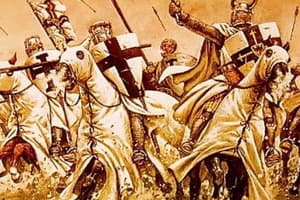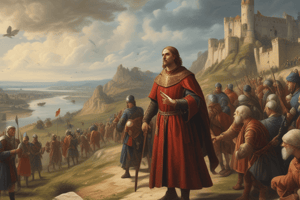Podcast
Questions and Answers
Erasmus believed that the Bible should be accepted without question.
Erasmus believed that the Bible should be accepted without question.
False
Humanism focused solely on religious studies and disregarded classical literature.
Humanism focused solely on religious studies and disregarded classical literature.
False
The Renaissance marked a shift in perception where the individual became central to human existence.
The Renaissance marked a shift in perception where the individual became central to human existence.
True
Filippo Brunelleschi is known for developing linear perspective in art.
Filippo Brunelleschi is known for developing linear perspective in art.
Signup and view all the answers
The representation of reality in earlier art forms was primarily focused on accuracy.
The representation of reality in earlier art forms was primarily focused on accuracy.
Signup and view all the answers
Classical Greek and Latin were seen as corrupted languages by the Church during the Renaissance.
Classical Greek and Latin were seen as corrupted languages by the Church during the Renaissance.
Signup and view all the answers
Erasmus accused the Roman Catholic clergy of promoting ignorance among the populace.
Erasmus accused the Roman Catholic clergy of promoting ignorance among the populace.
Signup and view all the answers
The idea of 'virtu' in Humanism emphasizes the importance of education and individual potential.
The idea of 'virtu' in Humanism emphasizes the importance of education and individual potential.
Signup and view all the answers
The Renaissance occurred from 1400 to 1650.
The Renaissance occurred from 1400 to 1650.
Signup and view all the answers
Dante Alighieri is known for his contributions during the Enlightenment period.
Dante Alighieri is known for his contributions during the Enlightenment period.
Signup and view all the answers
The Ottoman Turks first conquered Constantinople in 1453.
The Ottoman Turks first conquered Constantinople in 1453.
Signup and view all the answers
Byzantine scholars primarily influenced western culture through military conquest.
Byzantine scholars primarily influenced western culture through military conquest.
Signup and view all the answers
The Great Tradition maintained a fascination with ancient texts throughout the Middle Ages.
The Great Tradition maintained a fascination with ancient texts throughout the Middle Ages.
Signup and view all the answers
Manufacturing and Mediterranean trade made Italy one of Europe's poorest regions in the 13th century.
Manufacturing and Mediterranean trade made Italy one of Europe's poorest regions in the 13th century.
Signup and view all the answers
Humanism represents a shift from a focus on human experiences to a greater emphasis on divine interpretation.
Humanism represents a shift from a focus on human experiences to a greater emphasis on divine interpretation.
Signup and view all the answers
The Enlightenment occurred between 1650 and 1820.
The Enlightenment occurred between 1650 and 1820.
Signup and view all the answers
The discovery of the Americas shifted the economic center of Europe from the Atlantic to the Mediterranean.
The discovery of the Americas shifted the economic center of Europe from the Atlantic to the Mediterranean.
Signup and view all the answers
Martin Luther's actions in 1517 were a protest against the practices of the Catholic Church.
Martin Luther's actions in 1517 were a protest against the practices of the Catholic Church.
Signup and view all the answers
The printing press invented by Gutenberg in 1439 had no impact on the spread of Protestant ideas.
The printing press invented by Gutenberg in 1439 had no impact on the spread of Protestant ideas.
Signup and view all the answers
The Enlightenment sought to empower reason and combat ignorance and superstition.
The Enlightenment sought to empower reason and combat ignorance and superstition.
Signup and view all the answers
Humanism had a negligible influence on education during the Renaissance.
Humanism had a negligible influence on education during the Renaissance.
Signup and view all the answers
The rise of individualism began during the Renaissance period and continued into the Enlightenment.
The rise of individualism began during the Renaissance period and continued into the Enlightenment.
Signup and view all the answers
Rationalism became a prominent value in Europe during the Scientific Revolution and the Enlightenment.
Rationalism became a prominent value in Europe during the Scientific Revolution and the Enlightenment.
Signup and view all the answers
The authority of Rome was universally accepted by all Christians during the time of the Protestant Reformation.
The authority of Rome was universally accepted by all Christians during the time of the Protestant Reformation.
Signup and view all the answers
Study Notes
Lecture 3: The Challenge to Christian Europe
- The lecture discusses Europe's journey from religious dogma to rational thought, focusing on the period from the Christian Middle Ages through the Renaissance, Reformation, and Enlightenment.
- The transition involved a shift from a religious worldview to one emphasizing human potential and reason.
Guiding Questions
- Key questions for the week include defining features of humanism, factors contributing to the Renaissance, the nature of the Reformation as a departure from Roman Catholicism, and the central message of the Enlightenment.
- Related readings include Chapter 2 of Hirst's text and a documentary titled "The Story of Europe Part 3."
Time Frame
- Middle Ages: 500-1500
- Renaissance and humanism: 1400–1650
- Enlightenment: 1650–1820
- Visual timelines for these periods were presented, comparing them to other historical periods, such as ancient classical antiquity.
The Great Tradition
- The concept of a "Great Tradition" is explained, emphasizing a consistent fascination with classical antiquity throughout the Middle Ages, particularly through Charlemagne's court and the Catholic Church.
- The Church kept classical elements alive that didn't contradict Christian doctrine.
- Dante Alighieri (1265–1321) is mentioned as an exemplary figure during this period. Specific details about his work, Inferno, were included.
Prelude to the Renaissance #1: Italy in the West
- Italy's role as the birthplace of new ideas is highlighted, primarily around the 13th century due to significant trade and wealth accumulated from Mediterranean trade.
- Wealthy merchants and nobles developed secular attitudes, emphasizing life in the here and now, more so than thinking about the afterlife.
Prelude to the Renaissance #2: The Ottoman Turks in the East
- The rise of the Ottoman Turks as a major power is noted.
- Notably, the Ottoman conquest of Constantinople (1453) significantly impacted the Byzantine Empire, causing its cultural elite, scholars, and artists to seek refuge in Italy, adding to Italy's already rich cultural scene.
Prelude to the Renaissance #3: Light from the East
- Byzantine scholars brought their Christian traditions, which were strongly influenced by classical Greek civilization to Europe.
- Scholars brought ancient Greek texts, including those by Homer, Aristotle, and Plato, and also portions of the Greek Old Testament which had not been translated into Latin.
The Rise of Humanism
- The rise of humanism fostered critical thinking.
- European elites questioned religious authority and considered the Bible not only as historically shaped but as the product of human creation.
- European exposure to the Byzantine version of classical civilization further influenced how people viewed the world and the values of the classical civilizations.
- Interest in classical Greek and Latin languages replaced the traditional corrupted Latin used by the Church.
Erasmus: The Humanist par excellence
- Desiderius Erasmus (1465–1536), a significant Dutch scholar, challenged religious institutions such as the Church.
- He questioned the literal interpretation and acceptance of the Bible as absolute truth.
- He criticized the hypocrisy and ignorance of the Roman Catholic clergy in their education system.
- He advocated for studying non-religious secular classical texts.
The Renaissance and its "New Man"
- The Renaissance promoted Humanism as intellectual movement embracing varied artistic, musical, and other creative fields.
- The Renaissance emphasized that man should aspire to be a unique individual, with inherent gifts and talents recognized by God.
- Emphasis on recognizing man's innate creative potential.
- Renaissance emphasis on "humanist study", or "studium humanitatis" was critical in educating people to be 'new men'.
Realism
- Renaissance artists and writers aimed to portray the world realistically.
- Filippo Brunelleschi (1420) developed linear perspective, a key development in representing realism in art.
- Earlier representations were not intended to be photorealistic representations of the world; instead, artists focused on conveying a message.
- Renaissance art often highlighted the beauty and worth of the human being, which influenced modern understandings of human potential and worth.
Renaissance beyond Italy
- Renaissance ideas spread across Europe by the 16th century, influencing universities and other intellectual institutions in other European countries.
Big Changes
- Discovery of the Americas and alternative routes to Asia shifted the European economic center from the Mediterranean to the Atlantic.
- Mediterranean trade declined.
- The rise of other European countries in trade and industry including France, the Netherlands, England, and Germany due to commerce.
- Spain and Portugal gained great wealth from exploiting their American colonies.
Luther and Protestantism
- Johannes Gutenberg's movable type printing press of the mid-15th century allowed for mass production of books, including the Bible.
- Martin Luther's (1517) theological criticisms of the Catholic Church's practices initiated the Protestant Reformation.
- The movement emphasized returning to the fundamentals of Christianity.
- A split in Christian thought and practice arose, with different sects forming.
- Hirst used the phrase, "Christianity but not Roman", to describe the critical nature of Protestantism, highlighting a break from Catholic doctrine and the Pope's authority.
The Flood Gates Opened
- New humanist values, including critical thinking, individualism, and realism, significantly impacted European societies, causing a shift in thought and behavior.
- The Church's influence declined as people sought to live their lives outside of monastic confines, favoring education and the pursuit of knowledge more independently.
Scientific Revolution and Enlightenment
- These periods involved significant changes in how societies viewed the world.
- A movement using observation and questioning established theories occurred.
- Applying scientific methods across society was an attempt to reason through issues, and critical thinking challenged conventional approaches to government and society.
- The Enlightenment emphasized reason.
The Basis of Today's European Values
- Modern European society's values are rooted in the ideas developed during the Renaissance, Reformation, Enlightenment, and Scientific Revolution.
- This includes core concepts like individual rights, democracy, separation of secular and religious power, and rationalism.
Seminar Preparation Concepts
- Some of the themes for the seminar were listed as: "The Great Tradition," "Humanism," "The New Man of the Renaissance," "Virtu," "Protestantism," "The Enlightenment," "Rationalism," "Empiricism," and "Secularism.
Studying That Suits You
Use AI to generate personalized quizzes and flashcards to suit your learning preferences.
Related Documents
Description
This quiz explores Europe's transition from religious dogma to rational thought, covering the Middle Ages, Renaissance, Reformation, and Enlightenment. Key themes include humanism, the Renaissance's contributions, and the Enlightenment's impact on society. Prepare to discuss pivotal events and ideas that shaped European history during these periods.




